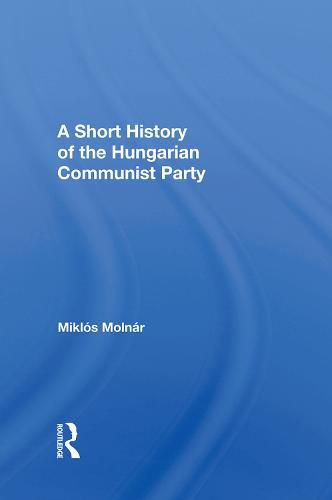Readings Newsletter
Become a Readings Member to make your shopping experience even easier.
Sign in or sign up for free!
You’re not far away from qualifying for FREE standard shipping within Australia
You’ve qualified for FREE standard shipping within Australia
The cart is loading…






In spite of its small size, the Hungarian Communist party (HCP), founded in the fall of 1918, has played an important role both in Hungary’s national history and in the international communist movement. Hungary, which was the only soviet republic other than the ephemeral Bavarian soviet republic to exist outside the USSR, lasted five months during the critical period of the Paris Peace Conference. The veterans of the Hungarian soviet republic, like Bela Kun, Georg Lukacs, and Eugen Varga, later held important posts in the Comintern and in the international Communist press. In the Stalinist era, the HCP distinguished itself by excessive zeal in the application of integral Stalinism in foreign policy (e.g., anti-Titoism), the economy, and political life (e.g., the Rajk and Kadar trials). However, the 1956 revolution was engineered by the revisionist communist intelligentsia and by such revisionist party leaders as Imre Nagy. Finally, in spite of its repressive role after the revolution, in the 1970s under Janos Kadar the HCP introduced a new system of liberalism and economic reform.
$9.00 standard shipping within Australia
FREE standard shipping within Australia for orders over $100.00
Express & International shipping calculated at checkout
In spite of its small size, the Hungarian Communist party (HCP), founded in the fall of 1918, has played an important role both in Hungary’s national history and in the international communist movement. Hungary, which was the only soviet republic other than the ephemeral Bavarian soviet republic to exist outside the USSR, lasted five months during the critical period of the Paris Peace Conference. The veterans of the Hungarian soviet republic, like Bela Kun, Georg Lukacs, and Eugen Varga, later held important posts in the Comintern and in the international Communist press. In the Stalinist era, the HCP distinguished itself by excessive zeal in the application of integral Stalinism in foreign policy (e.g., anti-Titoism), the economy, and political life (e.g., the Rajk and Kadar trials). However, the 1956 revolution was engineered by the revisionist communist intelligentsia and by such revisionist party leaders as Imre Nagy. Finally, in spite of its repressive role after the revolution, in the 1970s under Janos Kadar the HCP introduced a new system of liberalism and economic reform.